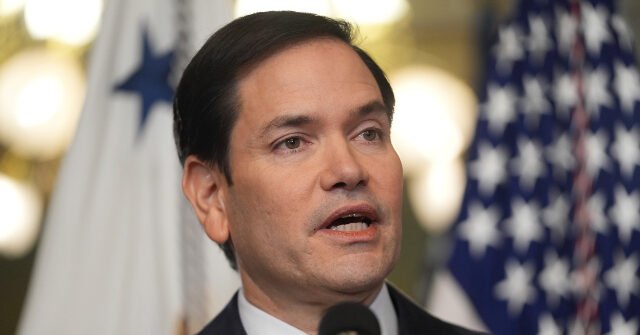Secretary of State Marco Rubio met with Costa Rican President Rodrigo Chaves Robles on Monday for discussions that prioritized cybersecurity concerns and Costa Rica’s longstanding conflict with Chinese telecommunications giant Huawei.
Costa Rica was the third stop on a tour of Central America and the Caribbean for Rubio, who made the Western Hemisphere trip the first of his tenure as America’s top diplomat. Rubio began the trip in Panama, where the government announced during his visit that it would allow a memorandum of understanding linking it to the Chinese Belt and Road Initiative (BRI), a sovereignty-eroding predatory lending program, expire. The then traveled to El Salvador, where leader Nayib Bukele offered to take in deportation flights including nationals of all countries and suggested he would be willing to house U.S. citizen convicts in American prisons for a price.
During a press conference with Chaves, a center-left leader, in Costa Rica on Monday, Rubio described cybersecurity, immigration, and organized crime as top challenges in the country that America was willing to help it overcome.
“In this country, they have over 100 million cyber attacks a year. That is unacceptable,” Rubio noted. “And we continue to build up on what we have so that we can face this foreign threat. Because it’s – this threat is used to compromise your system and threaten the state and its economy. This is something that we need to discuss, and we will cooperate on.”
Costa Rica is often considered a weak link in regional cybersecurity and was the target of one of the most audacious and sprawling ransomware attacks in modern history. In 2022, a hacker group known as Conti, believed to have originated in Russia, hacked into the Costa Rican Finance Ministry’s computer systems and used that entry to steal the personal information of thousands of Costa Ricans – used to demand $10 million initially, and more as time passed.
“For seven consecutive days, one institution after another had its systems hijacked and shut down,” Americas Quarterly detailed in its reporting of the hack. “Costa Ricans’ personal information from the tax office were released online, wages for public servants were in jeopardy, pensions that were to be paid that week were unavailable, and customs processes had to go back to paper.”
Conti, the hacker group, ultimately failed to extract the ransom because it was forced to cease operations after the 2022 Russian “special operation” against Ukraine began. The incident nonetheless alarmed the world’s cybersecurity experts and raised significant questions about Costa Rica’s ability to withstand state-backed cyberattacks and other online threats.
Rubio also addressed the strained relationship between Costa Rica and China as a result of the Costa Rican legal system targeting the telecommunications corporation Huawei. Huawei, which sells mobile phones and is developing 5G technology, was banned in the United States alongside fellow Chinese tech company ZTE for raising “unacceptable” national security concerns, including the possibility that Huawei and ZTE equipment could be used for espionage or infiltrating government networks. A 2022 FBI investigation found that American cell towers using Huawei equipment could potentially result in the disruption of important military communications.
Costa Rica’s dispute with Huawei is centered around accusations of corruption. In December, Chaves’s government filed criminal charges against Huawei and Yang Peng, its Costa Rica representative, as part of a larger corruption case against government officials. The government accused officials at the Costa Rican Electricity Institute of a variety of crimes including “fraud, bribery, influence peddling, and actions against the public treasury.”
“This is quite possibly one of the most shameless and massive corruption scandals that we have ever seen in this nation and this government does not let these things pass,” Chaves said following the charges. “It hurts me so much; this has implications beyond our borders, but we will not cower before situations of this nature.”
During his press conference with Chaves on Tuesday, Rubio recognized the Costa Rican government’s pursuit of the case without mentioning Huawei directly.
“5G is going to be critical technology for the development of all of the industries that are going to drive the 21st century. But it has to be secure,” Rubio said. “And when you confront companies that are not secure, they’re backed by governments like the Government of China that likes to threaten, that likes to sabotage … I think they deserve a lot of support in confronting that and in carrying out a process of responsibly bringing 5G, which is going to be essential to future economic development.”
Rubio commended Chaves as he did “not allow companies that pose a threat to national security or economic security and to – and when you take a stand against companies like that, there’s consequences.”
“You have had a staunch position of that, and we will continue to work and help with that,” he promised.
